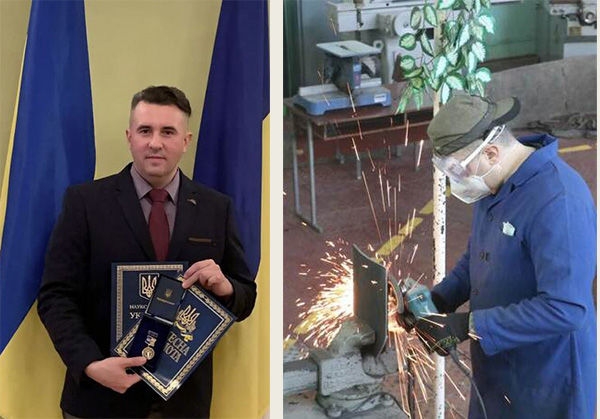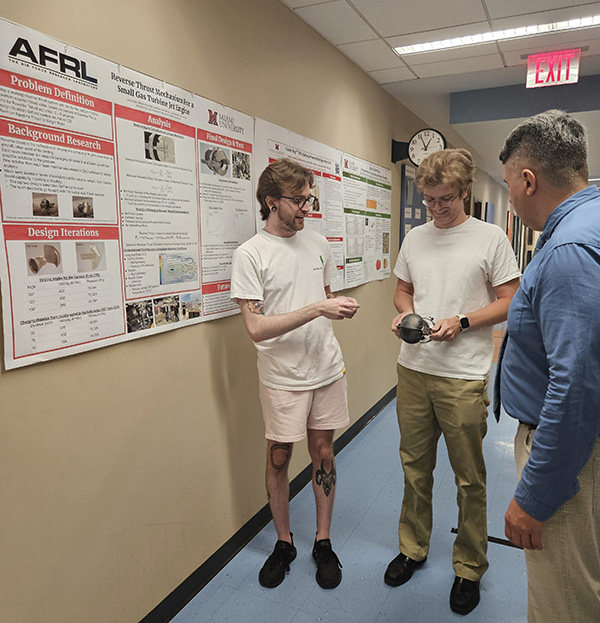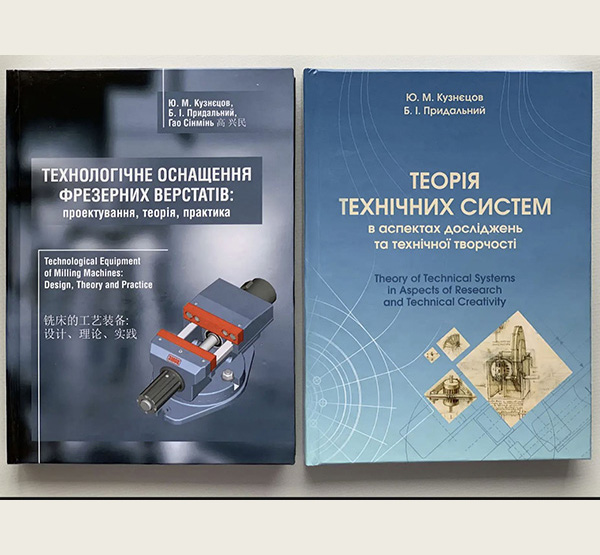Miami hosts Ukrainian scholar in the College of Engineering and Computing
The BridgeUSA Ukrainian Academic Fellows Program builds connections between Ukrainian and U.S. scholars

Miami hosts Ukrainian scholar in the College of Engineering and Computing
Over lunch, Ukrainian scholar Borys Prydalnyi told Stephen Norris about the Air Alert app on his phone that lets Ukrainian citizens know when air raids happen so they can get to the nearest bomb shelter.
The director of the Havighurst Center for East European, Russian and Eurasian Studies put the app on his own phone, adding Prydalnyi’s hometown of Lutsk, Oxford’s sister city of Dubno, and Cincinnati’s sister city, Kharkiv.
As the two were about to sit for an interview for this story, the app’s vibration alerted both men.
“This is real time. The entirety of Ukraine is under attack,” said Norris, Walter E. Havighurst Professor who led the effort with Miami’s Global Initiatives to bring Prydalnyi to campus Sept. 15-Oct. 15 under the BridgeUSA Ukrainian Academic Fellows Program, a U.S. State Department-sponsored initiative.
The engineer — the first Ukrainian scholar Miami has hosted since Russia’s invasion of Ukraine in 2022 — has a temporary office in the College of Engineering and Computing.
“I am interested to observe everything. Everything is new to me,” Prydalnyi said, noting that he will write a report on what he learns from this experience. This is his first time in the United States.

Talking about research
As he spends these weeks in Garland Hall, he regularly interacts with both graduate and undergraduate students as well as faculty.
One day, Prydalnyi spotted a large wall poster about a 2024 senior design project on implementing reverse thrust on a small jet engine. He struck up a conversation with the two students, Joey Reindl ’24 and Zach Mentzer ’24, who are now master’s students in Mechanical Engineering.
Reindl said it was “a happy accident” that they met the Ukrainian scholar after spotting him and others looking at their senior capstone project while they sat in the Mechanical and Manufacturing Engineering graduate office.
“We met Borys and got to talk about the challenges we faced in the design of our JetCat thrust reversal system last year as well as the loss and planned rebuilding of the largest plane in the world, Ukraine’s Antonov An-225,” Reindl said. “We invited Borys to attend our graduate seminar the following week where he got to listen to Dr. (Clayton) Cooper’s presentation, and I have had several more opportunities to talk about his research in the Industry 4.0 space!”
Added Mentzer: “It was so nice to be able to meet with a scholar from the other side of the world in our small college town. Borys was very intrigued with the research that Joey and I have been working on as graduate students and was eager to talk about his own research as well.”
Norris said these kinds of encounters are what the BridgeUSA program is meant to create.

Engineering a critical area
The BridgeUSA program builds links between Ukrainian and U.S. scholars for long-term collaboration in such areas as joint research, shared pedagogy, course development, and publication.
The program’s long-term goal is to help Ukrainian universities educate and train professionals critical to the country’s recovery and reconstruction through lasting collaboration with U.S. institutions of higher education.
The Havighurst Center is one of 23 academic programs to receive a scholar through the BridgeUSA program. Norris said he worked with Dmitriy Garmatyuk, professor of Electrical Engineering, to get Prydalnyi placed at Miami.
“It’s quite forward thinking that the U.S. State Department initiated this idea to bring Ukrainian scholars to America for one month and embed them in a school or a department to attend lectures, meet with faculty and students, and figure out ways to develop relations and kind of carry on their own research so they can carry that back to Ukraine,” Norris said.
The State Department has identified a series of critical areas, including diplomacy, democracy building, engineering, and education.
Norris called Prydalnyi “a perfect fit” because of his experience as an engineer. He has his Ph.D. and is working toward submitting a second dissertation, a requirement to earn a doctorate in the Ukrainian higher education system, which is modeled after how Germany does things.
Prydalnyi will meet with staff from Global Initiatives, the Menard Family Center for Democracy, as well as Provost Elizabeth Mullenix and Oxford Mayor Bill Snavely. Snavely has traveled to Oxford’s sister city Dubno, where Prydalnyi has relatives.

Hosting scholars-at-risk
Cheryl Young, associate vice president of Global Initiatives, said hosting scholars-at-risk allows Miami “to engage on the global scale to promote academic freedom, bring diverse perspectives and experiences to our campuses, enhance teaching and research, and strengthen global relationships and our standing as an international university.”
Shortly after Russia invaded Ukraine, they discussed what action Miami could take to do something rather than just talking about what was happening, Global Partnerships director Karla Guinigundo said.
“That led us to sign an MOU (memorandum of understanding) with the New University in Exile Consortium that committed to our efforts to provide an academic home for an endangered scholar at some point. This visit (by Prydalnyi) helps to fulfill that commitment,” said Guinigundo, who also maintains contact with the Institute for International Education’s Scholar Rescue Fund, which periodically sends out lists of scholars needing temporary placement.
“We then discuss potential collaborations for scholars whose work aligns with strengths here at Miami,” she said.
Prydalnyi is an associate professor in the applied mechanics and mechatronics department at Lutsk National Technical University. Lutsk is in northwest Ukraine, which Prydalnyi described as one of the quieter places during the war — but there is always concern.
Two summers ago, he worked with faculty and students rebuilding World War II-era bunkers near the college so they can go somewhere safe if necessary.
Prydalnyi doesn’t think the war will end anytime soon and that a peaceful resolution is unlikely.
“I think it’s not possible to have an agreement,” he said, adding that military action is the solution. “The war is evidence of how we can effectively fight."
For more Miami news, go to MiamiOH.edu/news.